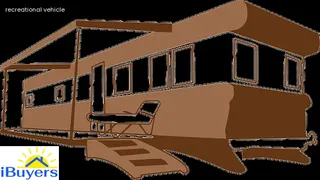Making the decision to live in an RV can be a big step, and requires careful consideration of both the pros and cons. On the plus side, living in an RV offers a more affordable housing option than buying or renting a home.
It also provides greater freedom of movement, allowing you to explore more places and experience new cultures. Additionally, it can be easier to maintain an RV than it is to keep up with the work required for a house.
On the downside, living in an RV can mean sacrificing certain comforts that come with having a traditional home like having your own dedicated space and access to amenities like laundry machines and showers. In addition, there is less storage available for your belongings and you may have difficulty finding campsites where you're allowed to stay for long periods of time.
Ultimately, whether or not selling your house and transitioning into life on the road is right for you depends on what's most important to you.

When considering the financial implications of selling your house and living in an RV full-time, it is important to understand what obstacles you may face. The first factor to consider is the cost of buying an RV.
Depending on the size and type of recreational vehicle, prices can range from a few thousand dollars for a used camper trailer to hundreds of thousands for a luxurious motorhome. It is also important to think about what you will do with the money from selling your home.
If you plan to use the proceeds as an income source while traveling, you need to make sure that it will be enough to cover your expenses. Additionally, you may have to pay taxes on any profits generated by the sale and may need to budget for insurance costs associated with owning an RV.
Lastly, don’t forget to factor in any costs associated with setting up a new permanent address when living on the road. With careful financial planning and budgeting, however, it is possible to overcome these obstacles and make full-time travel possible.
Making the decision to sell your house and live in an RV can be a big undertaking. It requires letting go of many possessions, and it’s an important step in decluttering your life.
Selling a house is a big responsibility and it can be daunting to tackle all the tasks that come along with it, from getting the most value for your property to finding the right buyer. Making sure you have the right paperwork filled out correctly is also paramount, so it’s important to plan ahead.
When moving out of a house into an RV, it’s vital to consider downsizing and sorting through items that will stay and those that need to go. Taking time to evaluate what you can do without is key before packing up; this will help make sure you don’t bring anything unnecessary with you on this new journey.
Knowing what items are essential for life on the road will help focus your efforts and make packing more efficient. In addition, understanding how much space you have in an RV makes it easier to determine what items are necessary versus those that can stay behind or be sold or donated.
Although the move may require a lot of hard work upfront, living in an RV can provide freedom from many obligations associated with owning a home like yard work or having too many bills each month.

Living in an RV can be a great way to explore the country and free yourself from the traditional home. However, making sure you have all of the necessary equipment for full-time living on wheels is essential.
You'll need items such as RV toilet paper, water hoses, sewer hoses, a power cord adapter, leveling blocks, and more. All of these items are required to ensure your RV is properly set up for living full-time.
Also, having a good quality generator is important as it will provide you with electricity during your travels. Additionally, you will want to make sure you have plenty of storage space for all of your belongings and camping gear so that everything stays organized while on the road.
Finally, good quality bedding and linens are essential for making sure your RV is comfortable enough to sleep in every night. With the right equipment in place, you can make sure that your experience living on the open road is safe and enjoyable!.
Full-time RV living has many benefits, such as offering a sense of freedom and flexibility that can't be found in traditional housing. However, it's important to consider the drawbacks associated with this lifestyle before making the decision to sell your house and hit the road.
To maximize the benefits and minimize the drawbacks of full-time RV living, you must be aware of both sides of the equation. From cost savings in fuel and travel expenses to being able to explore new areas without worrying about finding a place to stay, there are several perks to consider when deciding whether or not this type of lifestyle is right for you.
On the other hand, living in an RV full-time may create privacy issues due to sharing space with other people, and it may require sacrificing certain aspects of home life such as having access to a full kitchen or laundry room. Additionally, there are often limited storage options available in RVs so you'll need to be very mindful of what you bring on board.
Ultimately, understanding both the advantages and disadvantages associated with full-time RV living is key to determining if it's something you want to pursue.

Living in an RV can be an exciting and unique experience, but it is also a big lifestyle change. Moving from the comfort of your own home to a recreational vehicle requires some adjustment, especially if you’re used to having plenty of indoor space.
Before making such a drastic move, it’s important to weigh the pros and cons of selling your current house and transitioning into life on the road. Redefining home to include an RV means considering how you will adjust your living environment, what amenities you will need, and where you plan on parking or permanently living in your mobile home.
Financially, deciding whether to sell or keep your existing house also requires careful consideration; it’s important to factor in all costs associated with buying or renting an RV, as well as any related insurance fees. To make sure this transition is manageable for everyone involved, research different types of RVs and find out what kind best suits your family’s needs.
Living in an RV can be both liberating and anxiety-inducing; take the time to learn more about this lifestyle change before making any decisions so that you can make sure it is the right choice for you.
When selling your house and living in an RV, it is important to ensure that you have all the necessary items for a comfortable life on the road. This includes having the right heating and cooling system to regulate temperature, as well as making sure you have enough storage space for all of your belongings.
It is also essential to consider if you have the necessary kitchen appliances and cooking utensils to prepare meals while traveling. Additionally, think about what type of power source will be available in your RV, such as solar panels or a generator, so that you can stay connected to electricity.
Furthermore, it is important to make sure that there is adequate water storage for drinking, cleaning and bathing. Finally, depending on the size of your RV, take into account how many beds are available for additional guests or family members who may join you on the journey.
Taking these factors into consideration will allow you to enjoy an enjoyable lifestyle without compromising on comfort when living in an RV.

For those considering selling their house and living in a full-time RV, there are several advantages to consider. One of the primary benefits is the freedom to travel without being tethered to a single location.
When living in an RV, you can take your home with you wherever you go and explore new destinations at your own pace. Additionally, this lifestyle requires minimal possessions, so you don't need to worry about storage space or items accumulating over time.
Living in an RV also provides a financial advantage as it's typically much cheaper than owning and maintaining a home, plus there are many tax deductions available for those who choose this lifestyle. Finally, going full-time RVing offers unique opportunities to form close bonds with other likeminded travelers and create meaningful connections along the way.
Making the decision to sell your home and live in an RV is a big one, and it’s important to weigh the risks before you make such a drastic lifestyle change. There are many advantages to living in an RV, including more freedom and flexibility than traditional homeownership can offer.
There are also drawbacks, however, that should not be overlooked. Some of these include the cost of maintenance and repairs, as well as limited storage space.
Additionally, you may have to pay taxes on any rental income if you decide to rent out your RV while traveling. You will also need to consider the fact that RVs are typically much smaller than a house, so you may find yourself with less room for guests or family visits.
Finally, there is always a risk of running into mechanical problems during travel or adverse weather conditions which could put you in danger. It’s essential that you carefully consider all of these factors before making such a significant decision about your living situation.

Living in an RV is a lifestyle that many people are choosing to pursue. Making the transition from a traditional house to life on the road can be daunting, so it's important to consider all of the pros and cons before making this big decision.
One of the biggest advantages to living in an RV is cost savings. Generally speaking, RVs cost much less than houses, providing you with more financial freedom.
Additionally, RVs offer more flexibility when it comes to where you want to live. You can move around as needed without having to worry about selling your home or finding a new one.
On the other hand, there are drawbacks you need to be aware of when making this change. For example, living in an RV may require downsizing which can take some getting used to for those who were accustomed to having more space.
Additionally, travel expenses such as gas and campground fees can add up quickly if you are constantly on the move. Taking these factors into consideration will help ensure that you make an informed decision about whether living in an RV is right for you.
Living in an RV full-time can be a great adventure, but it’s important to consider how it might affect your mental and physical health. Moving out of a house and into an RV means different lifestyle changes that could have positive or negative effects.
It is important to stay mindful of the potential impacts of these lifestyle changes on your mental and physical well-being. One way to maintain your mental health is to make sure you are taking time for yourself each day - whether that’s getting out and exploring nature or just sitting down with a book.
Staying connected with family and friends is also essential, as it can help reduce feelings of loneliness or isolation. Making sure you have access to medical care is also important, since having regular checkups can help detect any potential issues early on.
Physically, maintaining a healthy diet is key - especially since many RVs don’t have large refrigerators or storage spaces to keep lots of food at once. Eating fresh produce and lean proteins will ensure you are getting all the nutrients you need while living in an RV.
Additionally, staying active and finding ways to exercise regularly will help keep your body feeling strong and healthy during your adventure.

Living the life of a full-time RVer is an exciting adventure that is becoming increasingly popular among those who desire more freedom. It can be a daunting prospect, however, and it's important to weigh all of the pros and cons before deciding if selling your house and living in an RV is the right choice for you.
Making the transition from traditional housing to a recreational vehicle requires some changes in lifestyle, but by following some tips, you can make sure that your adventure on the road is enjoyable and rewarding. From creating a budget to knowing where you can get supplies on the road, there are many things to consider when adapting to life in an RV.
The key is to build a plan that allows you to make the most of your new lifestyle while still keeping safety as your top priority. This may include packing essential items such as a first-aid kit, having enough food stocked up so you're never left without meals, and being mindful of local laws regarding overnight parking or camping limits.
Another important thing to think about when selling your house and moving into an RV is staying connected with friends and family back home. To do this, you'll need reliable internet access for communication as well as access to necessary documents like banking information or medical records.
By doing research ahead of time and planning out what adjustments will need to be made for living in an RV, you can ensure that your experience of living on the road will be both safe and rewarding.
Living in an RV provides a unique opportunity to explore the country and discover new communities. The freedom of life on wheels can be exhilarating, but it also has some downsides.
You may have to move more often than you'd like or find yourself outside of the traditional community structure that you're used to. To make the most out of this lifestyle, many RVers seek out other people who are living in RVs and form their own traveling communities.
These close-knit groups often help each other with repairs, share advice and resources, and provide a sense of familiarity as they travel from place to place. If you're considering selling your house and taking life on the road, finding these communities can be a great way to feel connected while still enjoying the freedom of RV living.

Staying connected with family, friends and the world while traveling in an RV can be a challenge. Many campgrounds offer Wi-Fi access, however, this service is often slow or unreliable.
Satellite internet provides more reliable internet access for travelers, but it is also more expensive than traditional internet services. Mobile hot spots are another option for those who need to stay connected while on the road.
This type of network provides users with a private connection over cellular data networks and often offers faster speeds than public Wi-Fi connections. Data plans vary by carrier so it's important to research available options before committing to one provider.
Additionally, some RVs come equipped with a cellular signal booster that enhances the existing connection and allows RVers to make and receive calls from anywhere they travel.
Learning from others can be a great way to gain insight and information about a major life decision you're considering, such as selling your house and living in an RV. And those who have already made the move into an RV often have stories to share about their experiences - both good and bad.
Take for example, the couple who sold all of their possessions, bought a camper, and set off on an adventure they never imagined that would take them across the country. They talk about how freeing it felt to live without all the material goods they once accumulated and how they were able to get closer as a family while living in the close quarters of the RV.
Conversely, there are also those who found themselves feeling lonely or isolated in their smaller home away from friends and family, or different challenges that arose with maintaining an RV. Every story is unique but there are certainly common themes that emerge when you listen to what people have to say about their experiences making such a big change in lifestyle.
Ultimately, it's important for each individual contemplating this kind of move to weigh out the pros and cons before taking action.
One of the most pressing questions for many homeowners is whether it is financially smart to sell their house and live in an RV. While living in an RV can offer a variety of advantages, there are also some serious financial considerations that must be taken into account.
For example, RV owners often have to pay ongoing maintenance costs and cover the expense of fuel, which can add up quickly. Additionally, they may need to pay fees for campsites or other lodging options while on the road.
On the other hand, living in an RV can save money by eliminating mortgage payments and reducing utility bills. Furthermore, downsizing to a smaller space may lead to less impulse shopping and more intentional purchasing decisions.
Ultimately, it’s important to weigh the pros and cons before deciding if selling your home and moving into an RV is financially smart for you.

When it comes to deciding whether or not to sell your house and live in an RV, the cost of living should be one of the first factors considered. Living in an RV can be significantly cheaper than living in a house, with some estimates stating that expenses for an RV lifestyle are as much as 20-50% lower than those associated with owning a home.
This is due largely to the fact that RVs require far less maintenance and upkeep, as well as the savings from utilities such as heat, water, and electricity. Additionally, people who choose to live in an RV have more freedom when it comes to selecting their location and often benefit from discounts on campsites or other amenities that come along with living in an RV.
On the other hand, while certain costs may be lower, there are other costs associated with owning and maintaining an RV that must be taken into consideration before making a decision.
Living in an RV can be a great way to explore the country and live a more minimalist lifestyle, but there are some negatives associated with this type of living arrangement. For one, the physical space of an RV is much smaller than a house and can become cramped over time.
Additionally, while RVs often have water tanks, they typically don’t have access to running water or sewage systems, meaning that you would need to find places to fill up your water tanks or use public restrooms. Another downside is that many campgrounds don’t allow for permanent stays and require frequent moves in order to remain there; this could make it difficult for you to stay in one particular place for an extended period of time.
Finally, heating and cooling an RV can be expensive due to their small size and lack of insulation – something that could take a bite out of your budget.
An RV can be a great investment to live in, with many advantages and disadvantages to consider. Those who choose to live in an RV may benefit from the financial savings associated with buying and maintaining one instead of a traditional home.
Additionally, RV living can provide an increased level of flexibility that allows you to move your home whenever you choose. On the other hand, some of the drawbacks associated with this lifestyle include limited space and potential difficulties finding a place to stay long-term.
Furthermore, those who decide to live in an RV full-time must also consider the fact that they may need to pay for a storage unit if they are away for extended periods of time. Ultimately, whether or not living in an RV is a good investment comes down to individual preferences and lifestyle goals.
A: That ultimately depends on your lifestyle and personal preferences. Consider the cost of ownership and maintenance for both, as well as any other financial implications that may arise due to a change in living situations. Ultimately, it is up to you to decide which option best suits your needs.